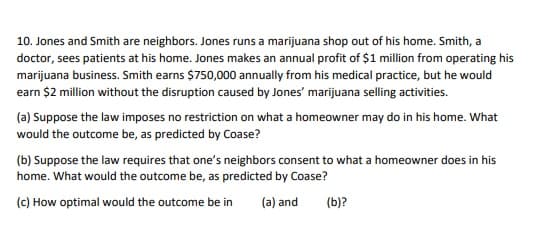10. Jones and Smith are neighbors. Jones runs a marijuana shop out of his home. Smith, a doctor, sees patients at his home. Jones makes an annual profit of $1 million from operating his marijuana business. Smith earns $750,000 annually from his medical practice, but he would earn $2 million without the disruption caused by Jones' marijuana selling activities. (a) Suppose the law imposes no restriction on what a homeowner may do in his home. What would the outcome be, as predicted by Coase? (b) Suppose the law requires that one's neighbors consent to what a homeowner does in his home. What would the outcome be, as predicted by Coase? (c) How optimal would the outcome be in (a) and (b)?
10. Jones and Smith are neighbors. Jones runs a marijuana shop out of his home. Smith, a doctor, sees patients at his home. Jones makes an annual profit of $1 million from operating his marijuana business. Smith earns $750,000 annually from his medical practice, but he would earn $2 million without the disruption caused by Jones' marijuana selling activities. (a) Suppose the law imposes no restriction on what a homeowner may do in his home. What would the outcome be, as predicted by Coase? (b) Suppose the law requires that one's neighbors consent to what a homeowner does in his home. What would the outcome be, as predicted by Coase? (c) How optimal would the outcome be in (a) and (b)?
Principles of Economics 2e
2nd Edition
ISBN:9781947172364
Author:Steven A. Greenlaw; David Shapiro
Publisher:Steven A. Greenlaw; David Shapiro
Chapter12: Environmental Protection And Negative Externalities
Section: Chapter Questions
Problem 11SCQ: The state of Colorado requires oil and gas companies who use fracking techniques to retune the land...
Related questions
Question
i urgently need help in this question please help me

Transcribed Image Text:10. Jones and Smith are neighbors. Jones runs a marijuana shop out of his home. Smith, a
doctor, sees patients at his home. Jones makes an annual profit of $1 million from operating his
marijuana business. Smith earns $750,000 annually from his medical practice, but he would
earn $2 million without the disruption caused by Jones' marijuana selling activities.
(a) Suppose the law imposes no restriction on what a homeowner may do in his home. What
would the outcome be, as predicted by Coase?
(b) Suppose the law requires that one's neighbors consent to what a homeowner does in his
home. What would the outcome be, as predicted by Coase?
(c) How optimal would the outcome be in
(a) and
(b)?
Expert Solution
This question has been solved!
Explore an expertly crafted, step-by-step solution for a thorough understanding of key concepts.
This is a popular solution!
Trending now
This is a popular solution!
Step by step
Solved in 3 steps

Knowledge Booster
Learn more about
Need a deep-dive on the concept behind this application? Look no further. Learn more about this topic, economics and related others by exploring similar questions and additional content below.Recommended textbooks for you

Principles of Economics 2e
Economics
ISBN:
9781947172364
Author:
Steven A. Greenlaw; David Shapiro
Publisher:
OpenStax

Essentials of Economics (MindTap Course List)
Economics
ISBN:
9781337091992
Author:
N. Gregory Mankiw
Publisher:
Cengage Learning

Brief Principles of Macroeconomics (MindTap Cours…
Economics
ISBN:
9781337091985
Author:
N. Gregory Mankiw
Publisher:
Cengage Learning

Principles of Economics 2e
Economics
ISBN:
9781947172364
Author:
Steven A. Greenlaw; David Shapiro
Publisher:
OpenStax

Essentials of Economics (MindTap Course List)
Economics
ISBN:
9781337091992
Author:
N. Gregory Mankiw
Publisher:
Cengage Learning

Brief Principles of Macroeconomics (MindTap Cours…
Economics
ISBN:
9781337091985
Author:
N. Gregory Mankiw
Publisher:
Cengage Learning

Principles of Microeconomics
Economics
ISBN:
9781305156050
Author:
N. Gregory Mankiw
Publisher:
Cengage Learning

Principles of Microeconomics (MindTap Course List)
Economics
ISBN:
9781305971493
Author:
N. Gregory Mankiw
Publisher:
Cengage Learning

Principles of Economics (MindTap Course List)
Economics
ISBN:
9781305585126
Author:
N. Gregory Mankiw
Publisher:
Cengage Learning